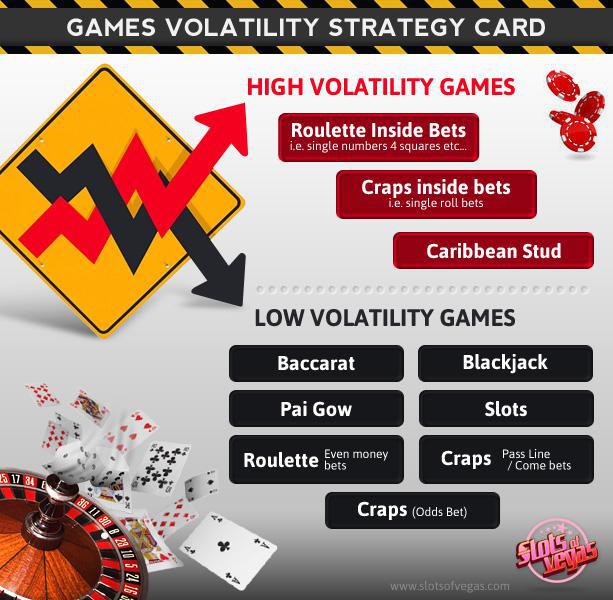Most of the time when you hear the word volatility, you think of stock market prices, explosive chemicals, or that very moody friend of yours. When something is volatile, it is subject to radical changes, ups and downs, and general turbulence. But in the world of casinos and gambling, volatility means so much more.
Learning the ins and outs of the volatility game will help you choose your favorite casino game. Maybe you like to play with a little money over longer periods. Or maybe you like the thrill of big payouts in rare intervals. This is the essence of game volatility. Read on to get the straight skinny on casino game volatility.
Games Volatility
A casino game’s volatility (or variance) refers to how often and how much you win during a long-term session. And when we say long-term, this could involve hundreds of hours of play. If you choose to play real money slot machines online for an extended period of time, you can begin to analyze the average payout and frequency of a particular game. Games with infrequent, high payouts are considered high-volatility games. Understanding the volatility of a game is essential when trying to maximize your winnings, as it can help you determine the best betting strategies and manage your bankroll effectively. A slot game with a very high and very rare payout is a high-volatility game. One which pays out in a regular sequence of low winning amounts is said to be a low-volatility game.
A game with medium volatility is a happy medium. It pays out semi-regularly, with varying sizes of wins. You may win 5 bucks every third game, and on the 20th game, hit a big win of thousands. All of the measures of a game’s volatility relate to probability and odds. In the old days of the classic ‘one-armed bandit’ slot machine, the casino could tamper with the mechanism and set the slot to be either ‘loose’ or ‘tight.’ As the names suggest, the loose slots payout more and the tight slots less. With online games using an RNG (random number generator), the odds are as close to truly random as possible.
To help you determine which bets have the lowest volatility, this chart will help to explain which bets to place.

Risk and Reward
A game itself can be high in volatility overall, but also have a certain bet that has a very low payout. For example, Craps has numerous bets with varying degrees of volatility. Some of these bets are extremely volatile, while others are some of the best bets of any game you can make. It’s important to mention that a low volatility game will likely be a low paying one; they generally have payouts of 1:1. A higher volatility game will have much higher payouts, but won’t pay often enough to make them worth going after. However, it can be lucrative and fun to go for these high paying bets. In fact, the level of risk involved in anything we do often determines the thrill factor.
They say there is no reward without risk. But how much you are willing to risk depends on your personality, comfort level, and bankroll. Generally speaking, a casual gambler with a lower bankroll would probably prefer to play a low volatility game. The low but regular payouts keep the player going long enough to enjoy playing the game without major risk.
But another category of gambler is the high roller. They generally have a larger bankroll, and don’t particularly care for meager payouts. They are going for the big win, and the risk of losing their money adds to the thrill. They are after the adrenaline rush of that elusive mega-payout.
Final Tips
TIP: Play each game for free before committing to playing for real money.
In order to choose an online game that pays real money, it’s best to figure out the volatility of the game you’re playing. Take full advantage of the demo option, and play for ‘play money.’ Once you have determined how often—and how much—the game pays out, you can get a general idea of the game’s volatility. Then you can play for real money.
TIP: Many online casino sites let you view the volatility rating of each game (especially slots).
It’s also important to remember to keep track of your bankroll, set aside only what you can afford to lose, and most importantly: know when to walk away.

